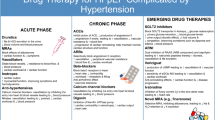Abstract
In an attempt to reduce the heart failure epidemic, screening and prevention will become an increasing focus of management in the wider at-risk population. Refining risk prediction through the use of biomarkers in isolation or in combination is emerging as a critical step in this process. The utility of biomarkers to identify disease manifestations before the onset of symptoms and detrimental myocardial damage is proving to be valuable. In addition, biomarkers that predict the likelihood and rate of disease progression over time will help streamline and focus clinical efforts and therapeutic strategies. Importantly, several recent early intervention studies using biomarker strategies are promising and indicate that not only can new-onset heart failure be reduced but also the development of other cardiovascular conditions.
Similar content being viewed by others
References
Papers of particular interest, published recently, have been highlighted as: • Of importance
Van Heerebeek L, Borbély A, Niessen HW, et al. Myocardial structure and function differ in systolic and diastolic heart failure. Circulation. 2006;113:1966–73.
Westermann D, Lindner D, Kasner M, et al. Cardiac inflammation contributes to changes in the extracellular matrix in patients with heart failure and normal ejection fraction. Circ Heart Fail. 2011;4:44–52.
Wang TJ, Larson MG, Levy DE, et al. Plasma natriuretic peptide levels and the risk of cardiovascular events and death. N Engl J Med. 2004;350:655–63.
Vellaichamy E, Kaur K, Pandey K. Enhanced activation of pro-inflammatory cytokines in mice lacking natriuretic peptide receptor-A. Peptides. 2007;28(4):893–9.
Phelan D, Watson CJ, Martos R, et al. Modest elevation in BNP in asymptomatic hypertensive patients reflects sub-clinical cardiac remodeling, inflammation and extracellular matrix changes. PLoS One. 2012;7(11).
Murtagh G, Dawkins IR, O’Connell R, et al. Screening to prevent heart failure (STOP-HF): expanding the focus beyond asymptomatic left ventricular systolic dysfunction. Eur J Heart Fail. 2012;14:480–6.
McGrady M, Reid CM, Shiel L, et al. NT-proB natriuretic peptide, risk factors and asymptomatic left ventricular dysfunction; results of the SCReening Evaluation of the Evolution of New Heart Failure study(SCREEN-HF). Int J Cardiol. 2013;169:133–8.
Nadir MA, Gandy S, Ireland S, et al. An increased B-type natriuretic peptide in the absence of a cardiac abnormality identifies those in whose left ventricular mass will increase over time. JACC Heart Fail. 2015;3(1):87–93.
Seliger S, de Lemos J, Neeland I, et al. Older adults, “malignant” left ventricular hypertrophy and associated cardiac specific biomarker phenotypes to identify the differential risk of new-onset reduced versus preserved ejection fraction heart failure—JACC Heart Failure 2015 (in press).
Wang TJ, Wollert KC, Larson MG, et al. Prognostic utility of novel biomarkers of cardiovascular stress. Framingham Heart Study Circ. 2012;126:1596–604. This important paper highlights that the value of measuring cardiovascular stress biomarkers in adding prognostic value to standard risk factors for predicting death, overall cardiovascular events, and heart failure.
Saunders JT, Nambi V, de Lemos JA, et al. Cardiac troponin T measured by a highly sensitive assay predicts coronary heart disease, heart failure, and mortality in the Atherosclerosis Risk in Communities Study. Circulation. 2011;123:1367–76.
Nadir MA, Rekhraj S, Wei L, et al. Improving the primary prevention of cardiovascular events by using biomarkers to identify individuals with silent heart disease. J Am Coll Cardiol. 2012;60:960–8.
de Lemos JA, Drazner MH, Omland T, et al. Association of troponin T detected with a highly sensitive assay and cardiac structure and mortality risk in the general population. JAMA. 2010;304:2503–12.
de Filippi CR, de Lemos JA, Christenson RH, et al. Association of serial measures of cardiac troponin T using a sensitive assay with incident heart failure and cardiovascular mortality in older adults. JAMA. 2010;304:2494–502.
Weinberg EO, Shimpo M, De Keulenaer GW, et al. Expression and regulation of ST2, an interleukin-1 receptor family member, in cardiomyocytes and myocardial infarction. Circulation. 2002;106:2961–6.
Sanada S, Hakuno D, Higgins LJ, et al. IL-33 and ST2 comprise acritical biomechanically induced and cardioprotective signaling system. J Clin Invest. 2007;117:1538–49.
Hughes MF, Appelbaum S, Havulinna AS, et al. ST2 may not be a useful predictor for incident cardiovascular events, heart failure and mortality. Heart. 2014;100:1715–21.
Chen LQ, de Lemos JA, Das SR, Ayers CR, Rohatgi A. Soluble ST2 is associated with all cause and cardiovascular mortality in a population based cohort. Dallas Heart Study Clin Chem. 2013;59:536–46.
Lok DJ, Van Der Meer P, de la Porte PW, et al. Prognostic value of galectin-3, a novel marker of fibrosis in patients with chronic heart failure. Clin Res Cardiol. 2010;99:323–8.
Ho JE, Liu C, Lyass A, et al. Galectin-3, a marker of cardiac fibrosis, predicts incident heart failure in the community. J Am Coll Cardiol. 2012;60:1249–56.
Browers FP, van Gilst WH, Dammen K, et al. Clinical risk stratification optimises value of biomarkers to predict new-onset heart failure in a community based cohort. Circ Heart Fail. 2014;7:723–31. This is an important paper highlighting a multi-marker approach to risk stratify patients in the prediction of new onset heart failure.
Neeland IJ, Drazner MH, Berry JD, et al. Biomarkers of chronic cardiac injury and hemodynamic stress identify a malignant phenotype of left ventricular hypertrophy in the general population. J Am Coll Cardiol. 2013;61(2):187–95.
Neuhold S, Resl M, Huelsmann M, et al. Repeat measurements of glycated haemoglobin A and N-terminal pro-B-type natriurietic peptide: divergent behaviour in diabetes mellitus. Eur J Clin Investig. 2011;41(12):1292–8.
Wang TJ, Gona P, Larson MG, et al. Multiple biomarkers for the prediction of first major cardiovascular events and death. N Engl J Med. 2006;355:2631–9.
McMurray JJ. CONSENSUS to EMPHASIS: the overwhelming evidence which makes blockade of the renin angiotensin aldosterone system the cornerstone of therapy for systolic heart failure. Eur J Heart Fail. 2011;13:929–36.
Minguet L, Sutton G, Ferrero C, Gomez T. Bramlage P.LCZ 696: a new paradigm for the treatment of heart failure? Expert Opin Pharmacother. 2015;16:435–46.
Ledwidge M, Gallagher J, Conlon C, et al. Natriuretic peptide-based screening and collaborative care for heart failure: the STOP-HF randomized trial. JAMA. 2013;310(1):66–74. This study provides the first evidence that natriuretic peptide screening and collaborative of patients at risk of heart failure can reduce the combined rates of left ventricular systolic dysfunction, diastolic dysfunction, and heart failure.
Huelsmann M, Neuhold S, Resl M. PONTIAC (NT-proBNP selected PreventiOn of cardiac eveNts in a population of diabetic patients without a history of Cardiac disease): a prospective randomized controlled trial. J Am Coll Cardiol. 2013;62:1365–72.
Madamanchi C, Alhosaini H, Sumida A, Runge MS. Obesity and natriuretic peptides, BNP and NT-proBNP: mechanism and diagnostic implications for heart failure. Int J Cardiol. 2014;17:611–7.
Davis ME, Richards M, Nicholls G, Yandle TG, Frampton CM, Troughton RW. Introduction of metoprolol increases plasma B-type natriuretic peptides in mild stable heart failure. 2006;113:977–85.
Acknowledgments
This work was supported by the European Commission FP7 project FIBRO-TARGETS and HOMAGE and the Health Research Board of Ireland [grant numbers 602904; 305507; CSA-2012-36, respectively].
Compliance with Ethics Guidelines
ᅟ
Conflict of Interest
Chris Watson, Mark Ledwidge, Ken McDonald and Joe Gallagher have no relevant disclosures to report.
Human and Animal Rights and Informed Consent
This article does not contain any studies with human or animal subjects performed by the author.
Author information
Authors and Affiliations
Corresponding author
Additional information
This article is part of the Topical Collection on Heart Failure Prevention
Rights and permissions
About this article
Cite this article
McDonald, K., Ledwidge, M., Gallagher, J. et al. Biomarker Testing and Pre-emptive Therapy in Preventing Heart Failure. Curr Cardiovasc Risk Rep 9, 27 (2015). https://doi.org/10.1007/s12170-015-0456-3
Published:
DOI: https://doi.org/10.1007/s12170-015-0456-3




